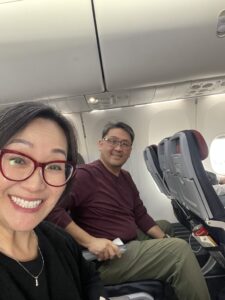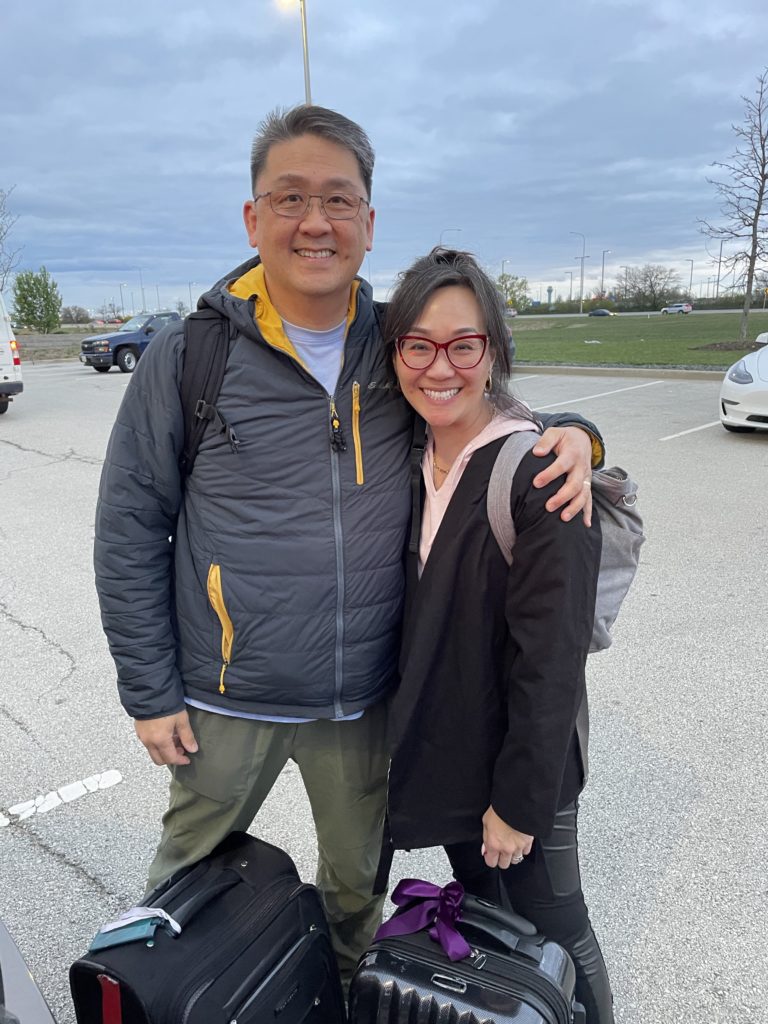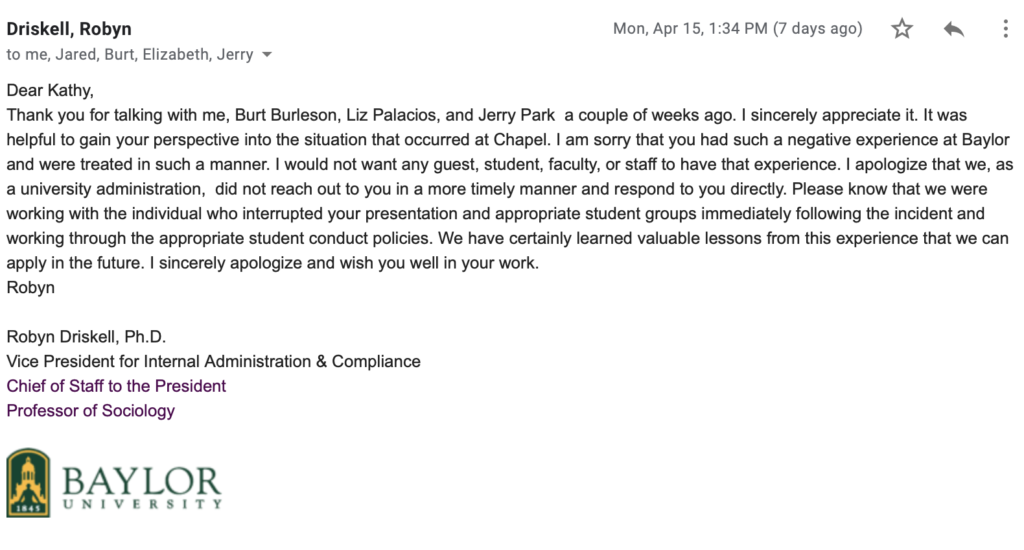If you’re newish here, this is my annual post about my marriage. I am not a licensed therapist. I am not a marriage counselor. I am a woman getting ready to mark 31 years of marriage by sharing some reflections, stream of consciousness-style.
My Dear Readers, you know the drill. Yes, it’s been another year, and this year is our palindrome anniversary (4-24-24)! What is time??
- Over communicate everything. Oh, if we had only started our marriage by oversharing, reiterating, and asking clarifying questions, but we were in luuuuuuuuv and luuuuuuuv conquers all.
- Luuuv doesn’t conquer all, but love sustains this marriage of mine – being in love, being loving, loving.
- Romance is not the same as love. It can be a way to communicate love, but it’s not the only way to communicate love.
- I really enjoy gifts of fresh flowers, but I didn’t when we were first married because they made me anxious because $$$. Now we have a Trader Joe’s and more room in our budget.
- I am not always in love with Peter (I’m sure it’s mutual, but this is my blog), and if I only focused on the lack of warm fuzzies and romance our marriage would not have made it. I love Peter.
- Sometimes I don’t like my husband’s choices or actions (again, I am positive this is mutual but he doesn’t blog), which is when I remind myself I love him.
- Old habits die hard. One person in the marriage rarely made the bed. The other person more often than not made the entire bed. And then she got tired and just made her side of the bed. And then she stopped caring just when the other person started making his side of the bed. Go figure. Both old dogs learned new tricks. It’s possible.
- Marriage is amazing, even without curated images posted on social media.
- Marriage is challenging, especially with the curated images posted on social media.
- What anyone posts on social media isn’t the whole of what’s going on in life, let alone a marriage. My husband and I continue to learn how to manage our consumption of social media while I manage my own social media presence.
- CPAPs can save marriages. I can still hear the CPAP, but it’s so much better than listening to snoring.
- We/I set a gift rule early in our marriage – no appliances. Sometimes rules are meant to be broken. Peter years ago bought me an Italian espresso maker and burr grinder. He does not drink coffee.
- Sometimes our different attitudes and values around money and spending are challenging, and so we go back to #1. Know your own issues around money and how those issues present themselves. I grew up pinching every penny, saving every condiment packet, and searching clearance racks first. I had to learn that behavior doesn’t make me a better person or even a person who saves “more” money. (But it kinda does, doesn’t it? JK. I only keep the ketchup and soy sauce packets. No mustard or mayo. He grabs so many napkins, though, that sometimes even I am embarrassed.)
- Back to sleep: we grew up in church and were told, “Do not let the sun go down on your anger.” That was BAD advice for us. We both do much better with sleep. We do angry and arguing better with sleep. We do not do reconciliation and forgiveness at 1am. We go to bed and pick up where we left off after work because we also have to sleep to go to work to pay the bills.
- Marriages go through seasons and phases of development. The hardest was hitting the sandwich generation stage just after a decade of marriage with three young children.
- You can marry someone of your same culture and ethnicity and still be in a cross-cultural marriage. Peter was born in the US. I came to the US at 8 months so same thing, right? WRONG. My younger sister never calls me by my first name. IYKYK.
- I’ve heard as you get older people need less sleep and eat less. We have not hit that stage of life or marriage.
- It’s good and healthy to have common friends and separate friends. He had bowling buddies he talked about for years. I have writer friends he probably will never meet. Our marriage is better because he could talk bowling with his bowling friends, and I can talk writing with writing friends.
- It’s also good and healthy to have common interests and hobbies and separate interests and hobbies. Sometimes they rub off on you; I watch more movies in different genres because Peter LOVES movies. Sometimes you try bowling, but it doesn’t get beyond buying my own bowling shoes because I do not prefer renting shoes.
- Peter still can’t read my mind. He asked me what we were going to do for our anniversary, and I responded, “Hm. What are we going to do, Peter?” (Thanks, Tina, for the coaching.) I blinked my eyes and stared at him, and once again learned he cannot mind meld. I told him I would like to go out to dinner.
- I love buying myself flowers, too. It doesn’t mean Peter doesn’t love me. Sometimes you don’t need your spouse to get you that gift or take you to the thing or surprise you with whatever. Sometimes you can do that for yourself. Don’t expect others to be the sole source of joy and care.
- This one is for the churchy people: I still don’t know what it means to be “spiritually compatible.”
- Another one for the churchy people: I stayed at two churches until Peter was ready to leave. I will not go back, even if Peter is ready, until I am ready to go back.
- I really don’t think there is such a thing as a 50/50 marriage. You can’t divide life in half every moment. It’s just when one person is carrying the heavier load for longer with no acknowledgement or help when things crumble.
- When things crumble, before things crumble, you need to ask for help, for new and clear expectations. That’s probably what got us through the toughest part of our sandwich generation season.
- Speaking of crumbling, women in perimenopause you are about to find out how brittle and dry your entire being can become. Hair, nails, skin, eyeballs, vagina – ALL OF IT. Dry as bread crumbs. Drying up like a walking desert coupled with mood changes, hot flashes and/or night sweats, sleep issues, anxiety, etc. will make any relationship a challenge. I’m done, which means no more eggs, but I swear my post-menopausal life is just less hot flashy/night sweaty but everything else remains. Let’s talk!
- I’m still unpacking all the unhealthy and unhelpful messages about sex (it’s bad and dangerous if you’re not married to another Christian, and then sex is automatically good and easy after you marry a Christian) and aging and menopause aren’t helping.
- Lubricants are helping. (Again, no one told me about that when I got married. HELLO?!?!?!)
- At this season of our marriage, it’s not the quantity of sex but the quality, which actually should always be important – mutual pleasure was not brought up in our pre-marital counseling.
- As I’m typing this I guess I should really ask Peter what he thinks about the quantity part. See, 31 years and I’m still learning, too, to over-communicate. Also, none of this was taught nor do I see it discussed much in the world out there.
- I think Peter and I work not because we are opposites but because we make the other person want to become a better version of ourselves. And by better I don’t mean thinner or more fit or younger looking. (But I’m not gonna lie. I’m so glad he is my Botox injector.) We make each other want to be kinder, more patient, more loving and generally better humans – more Christlike rather than just Christians.
Any married folks want to add your lessons learned, My Dear Readers? And single folks what wisdom do you have to share about friendships (or marriages you have observed or been a part of) because if marriage isn’t a friendship, it’s doomed.




